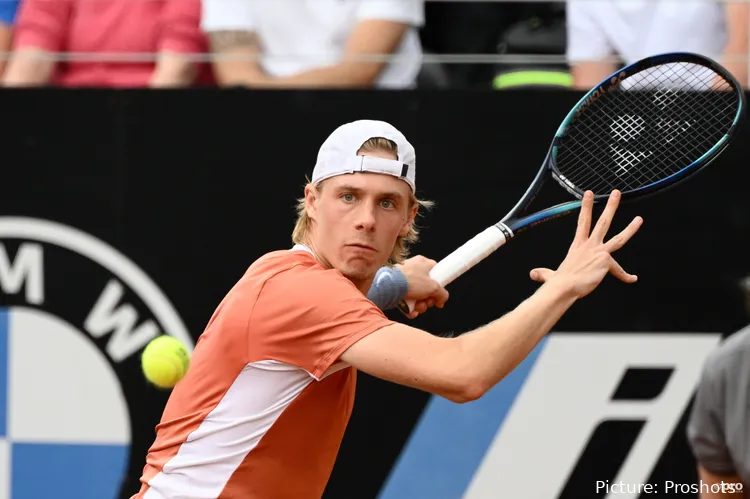
Canadian tennis star Denis Shapovalov recently addressed the controversy surrounding his remarks about Italy’s Jannik Sinner, clarifying that his criticism of the International Tennis Integrity Agency (ITIA) and World Anti-Doping Agency (WADA) was not aimed at Sinner personally. The situation stems from Sinner’s involvement in a doping case that has sparked intense debate within the tennis community.
The Context: Sinner’s Doping Case
In 2024, Jannik Sinner faced allegations after testing positive for clostebol, a banned substance, in two separate doping tests. Clostebol, an anabolic steroid, is prohibited under WADA regulations due to its performance-enhancing effects. However, Sinner’s case took a complex turn when the ITIA ruled in his favor, accepting the defense that the substance entered his system through a medicinal cream prescribed to treat an injury. This explanation, supported by medical documentation and expert testimony, led the ITIA to clear Sinner of intentional wrongdoing and avoid imposing a suspension.
The ruling was met with mixed reactions. Supporters of Sinner argued that the decision was fair, given the lack of evidence suggesting deliberate doping. However, critics highlighted perceived inconsistencies in how anti-doping regulations are applied. WADA’s subsequent appeal to the Court of Arbitration for Sport (CAS) further fueled the debate, as the agency sought a two-year suspension for Sinner, contending that the ITIA’s decision set a troubling precedent.
Shapovalov’s Initial Comments: A Call for Consistency
Denis Shapovalov was among the vocal critics of the ITIA’s handling of the case. In his initial remarks, he expressed frustration over what he saw as a lack of uniformity in anti-doping rulings. “Some players have contaminated substances and are sanctioned for years, while others do not face the same consequences,” Shapovalov remarked, urging WADA to take a more proactive role in ensuring fairness and consistency.
These comments resonated with many who have long questioned the transparency of anti-doping processes. Shapovalov drew parallels to other high-profile cases, such as that of Chilean player Nicolás Jarry, who received an 11-month suspension in 2020 after testing positive for banned substances. Jarry’s case involved contaminated supplements, and despite evidence suggesting unintentional ingestion, he faced significant sanctions. This discrepancy, Shapovalov argued, underscores the need for standardized treatment across all cases.
Backlash from Italian Fans and Clarification
Shapovalov’s remarks, however, were widely misinterpreted by some fans and media outlets as a direct attack on Jannik Sinner. This led to a backlash, particularly from Sinner’s supporters in Italy. Addressing the controversy in a recent interview, Shapovalov sought to set the record straight. “There were so many Italian fans after me,” he recounted. “I made a comment about the Sinner case, but I didn’t comment about Sinner. To me, it had nothing to do with Sinner.”
Shapovalov emphasized that his critique was directed at the broader issue of inconsistent anti-doping rulings, not at Sinner personally. “It was the principle,” he explained. “A guy like Jarry was banned for three years or whatever it was, and other guys are playing. Where is the fine line? It should be consistent and the same for all players.”
He expressed frustration at being misinterpreted, noting that his intention was to highlight systemic issues within the anti-doping framework. “I’m not WADA. I’m not here to decide whether Sinner should be banned or not,” Shapovalov clarified. “But so many Italian fans started losing it. It was insane.”
Broader Implications: The Need for Transparent Anti-Doping Policies
Shapovalov’s comments have reignited a broader conversation about transparency and fairness in anti-doping regulations. The Sinner case is not an isolated incident; it reflects ongoing challenges in balancing rigorous enforcement with equitable treatment. Critics argue that high-profile athletes often receive more lenient treatment, while others face harsher penalties for similar infractions.
The call for consistency is not new. Over the years, numerous athletes and experts have pointed out disparities in how doping cases are handled. Factors such as the availability of legal resources, the nature of the banned substance, and the athlete’s profile can all influence outcomes. Shapovalov’s remarks underscore the need for a more transparent and standardized approach to ensure that all players are held to the same standards.
The Role of WADA and ITIA
The World Anti-Doping Agency and the International Tennis Integrity Agency play crucial roles in maintaining the integrity of the sport. However, cases like Sinner’s highlight the complexities they face in enforcing anti-doping rules. The agencies must navigate a delicate balance between protecting clean athletes and ensuring that those accused of doping receive fair treatment. The appeal to CAS suggests that WADA is seeking to reinforce its authority and set a precedent for future cases.
Moving Forward: Lessons for the Tennis Community
As the tennis world awaits the outcome of WADA’s appeal, the Sinner case serves as a reminder of the challenges inherent in anti-doping enforcement. For players like Shapovalov, the controversy has underscored the importance of speaking out against perceived injustices, even at the risk of facing backlash. His call for consistency resonates with many who believe that the integrity of the sport depends on fair and transparent regulations.
At the same time, the incident highlights the need for constructive dialogue within the tennis community. Misinterpretations and knee-jerk reactions can exacerbate tensions and distract from the underlying issues. Shapovalov’s clarification offers an opportunity to refocus the conversation on the broader principles at stake.
Conclusion: A Call for Fairness and Transparency
Denis Shapovalov’s comments on Jannik Sinner’s doping case have sparked important discussions about fairness and consistency in tennis. While his remarks were initially misunderstood, his clarification sheds light on the need for more transparent and equitable anti-doping policies. As the tennis world grapples with these challenges, voices like Shapovalov’s play a crucial role in advocating for a sport that upholds the highest standards of integrity and fairness.
Leave a Reply